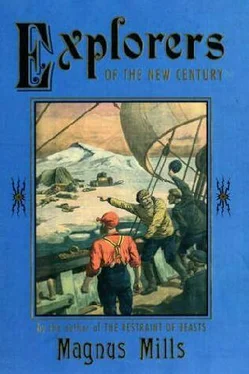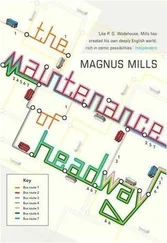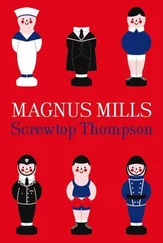“Yes, sir,” replied Sargent. “That’s what I am.”
“And does that list of trades include carpentry?”
“I can do a bit of joinery, yes.”
“All right, well, we won’t quibble over semantics.”
“Sir?”
“You can call yourself a joiner if you wish.”
“Thank you, sir.”
“What I want, Sargent, is for you to build me a kind of portable chair: something that can be borne by four men, one at each corner. In ancient times such a conveyance was known as a litter. It needs to be as light as possible, but strong enough to take Gribble’s weight. We’ve decided if she won’t walk to the Furthest Point then we’ll jolly well carry her there! Do you have any questions, Sargent?”
“None I can think of, sir.”
“Then you can start directly. Use whatever materials you require.”
“Right you are, sir.”
After Sargent had gone, Johns turned to Scagg. “There’s one slight consolation arising from the loss of the four mules,” he said. “It means our rations should stretch that little bit further. Heaven knows, we’re going to need all our strength in the coming days.”
§
Sargent spent several hours building his portable chair. First he gathered together the few available pieces of timber (including Chase’s instrument case, now empty) and laid them out on the ground. Then, when he’d devised a basic pattern, he set to work. For most of the time his companions left him undisturbed, instead seizing the opportunity to complete minor tasks of their own. Eventually, however, Plover wandered over to see how Sargent was getting along. By this stage the litter was halfway to completion.
“This is sheer folly,” Plover murmured, when he saw it. “The mules are supposed to be our bearers, not the other way round.”
“I’m only doing what I’ve been told,” replied Sargent.
“I’m aware of that,” said Plover. “Yours is not to reason why.”
“Exactly.”
“Well, so much for our ‘dash’ to the Furthest Point. At this rate it’ll take a month of Sundays.”
“Plover!” called Johns from the other side of the camp. “Can I have a word, please?”
“I’ll be right with you, sir!”
When Plover joined him, Johns asked, “Why do you persist in wearing that high-peaked cap in these conditions?”
“Sorry, Mr Johns,” rejoined Plover. “Actually, I forgot I was still wearing it.”
Johns looked him up and down. “You always have to be different, don’t you?” was all he said.
Some while later, as Johns and Scagg conferred over their notes, they were approached by Sargent. At first he went unnoticed and merely hovered awkwardly nearby. Finally, Johns looked up.
“Yes, Sargent?”
“It’s about the handles, sir.”
“What about them?”
“We haven’t got any.”
“Is there nothing to spare?”
“No, sir,” said Sargent. “We’re short of two stout poles. The chair needs one on each side, so it can be carried properly.”
“How long do these poles need to be?”
“About the same length as the tent poles, sir.”
Johns gave a sigh. “Very well, Sargent,” he said. “I suppose if you must have them you must.”
“But then we’ll be down to a single tent!” objected Scagg. “We can’t sleep seven at a time!”
“I know, Scagg, I know,” said Johns. “I’m afraid all of us will just have to take turns and get by as best we can.”
“If I could have the ridge pole as well, sir,” Sargent ventured, “I could improve the basic frame.”
Ultimately it was agreed that not only were the tent poles to be sacrificed, but also a section of canvas, so the litter could be fitted with a canopy to protect Gribble from the weather. In addition it was to have an upholstered seat. This would be made separately by Summerfield, who had offered his services to help speed things up. The afternoon was swiftly wearing on.
“Clearly, we’re not going to get moving until tomorrow,” said Johns. “So we might as well draw up a sleeping roster beginning immediately. Can you see to that please, Scagg?”
“Yes, sir.”
In the event it was not until after dusk that the litter was finished. By this time, one or two lamps had been lit and the stove was on for supper. When Johns heard the job was done, he went and carried out an inspection, after which he congratulated Sargent and Summerfield for their fine workmanship. Then Gribble was brought over.
“Now, Gribble,” said Johns. “We’ve built this so that you can travel safe and sound to our destination. Would you like to try it?”
Gribble said nothing, but silently parted the canopy and stepped on to the litter. Then she sat down and closed the canopy behind her. The men waited. From within there came a quiet cough. They all moved away slightly. A minute passed.
“Gribble?” said Johns. “Gribble, do you like it?”
There was no reply.
“Gribble, why don’t you come out and eat?”
Further silence.
“Looks as if she’s turned in for the night,” suggested Scagg.
“All right, well, that’s all the more supper for each of us,” said Johns.
When this comment brought no response, they gave up and left Gribble alone.
§
The new sleeping arrangements entailed five men occupying the single remaining tent, while two others waited outside. These ‘nightwatchmen’ were to be replaced hourly on a rotating basis until everyone had done a stint. The first names on the roster belonged to Seddon and Sargent, so when their companions went to bed they made themselves as comfortable as they could under their utility blankets.
“To tell the truth, it doesn’t make much difference to me whether I’m inside or out,” declared Sargent. “After the day I’ve had I could sleep standing up in my boots.”
“If I were you I wouldn’t say that too loudly,” answered Seddon. “It sounds like you’re volunteering.”
“Me?” said Sargent. “Volunteer? Never!”
During the succeeding hours the diminutive encampment underwent repeated onslaughts of wind and dust. Dust now lay thick on every surface: on the tent, on the stack of supplies, on the canopy of the portable chair; and it only served to worsen the already poor visibility. By general accord the lanterns were extinguished overnight, which meant each pair of watchmen fulfilled their spell in total darkness. This later resulted in a surprise for Sargent. Despite protestations from Scagg, Johns had insisted on having his own name included on the roster so that he could carry out his fair share of the duties. In consequence it was Johns who eventually emerged to relieve Sargent. His advancing figure was barely perceptible in the gloom.
“About time too,” growled Sargent, who hadn’t bothered to examine the roster in detail.
“Good evening, Sargent,” said Johns. “I believe I’m quite punctual, as a matter of fact.”
“Oh, sorry, sir. I didn’t know it was you.”
“Who did you think it was then?”
“Er…not sure, sir.”
“Someone who can’t tell the time, perhaps?”
“No, sir.”
“You really should be more careful what you say, Sargent,” observed Johns. “I could have been anybody coming along.”
“Yes, sir. Sorry.”
“Sleep well, Sargent.”
“Thank you, sir.”
Meanwhile, Plover had made an appearance, relinquishing his place in the tent to Seddon.
“Ah, Plover,” said Johns, glancing up briefly.
There was little further conversation. If Johns noticed that Plover had reverted to his woolly helmet then he didn’t mention it, and for his part Plover drew no particular attention to the fact. Instead they sat side by side, with their backs to the wind, and for the ensuing hour exchanged only occasional banalities. Next to turn out were Chase and Scagg. These two got on easily together, and passed the time discussing obscure geographical matters. They were followed in due course by Sargent and, lastly, Summerfield. Sargent was down-in-the-mouth, and complained at some length that the roster had been deliberately set up ‘against’ him.
Читать дальше












